Analyzing CSR's Impact on Esprit's Brand Trust and Satisfaction
VerifiedAdded on 2020/06/04
|24
|7600
|27
Report
AI Summary
This research project investigates the impact of Corporate Social Responsibility (CSR) on brand trust and brand satisfaction, focusing on the company Esprit. The report begins with an overview of CSR, its factors, aims, and objectives, followed by a literature review exploring the link between CSR and brand relationships, the impact of branding on consumer purchase decisions, and the effects of CSR on brand relationships. The methodology section details the research approach, design, philosophy, type, data collection methods, ethical considerations, and limitations. The data analysis section employs thematic analysis to interpret the findings. The conclusion and recommendations summarize the key insights and suggest strategies for organizations to improve brand trust. The report emphasizes the importance of CSR in building a strong brand image, fostering customer loyalty, and achieving business objectives, highlighting the dimensions of CSR, including economic, legal, ethical, and philanthropic responsibilities. The research aims to identify the impact of CSR on brand relationships, assess its influence on consumer behavior, and recommend strategies for enhancing customer trust.

Research Project
1
1
Paraphrase This Document
Need a fresh take? Get an instant paraphrase of this document with our AI Paraphraser
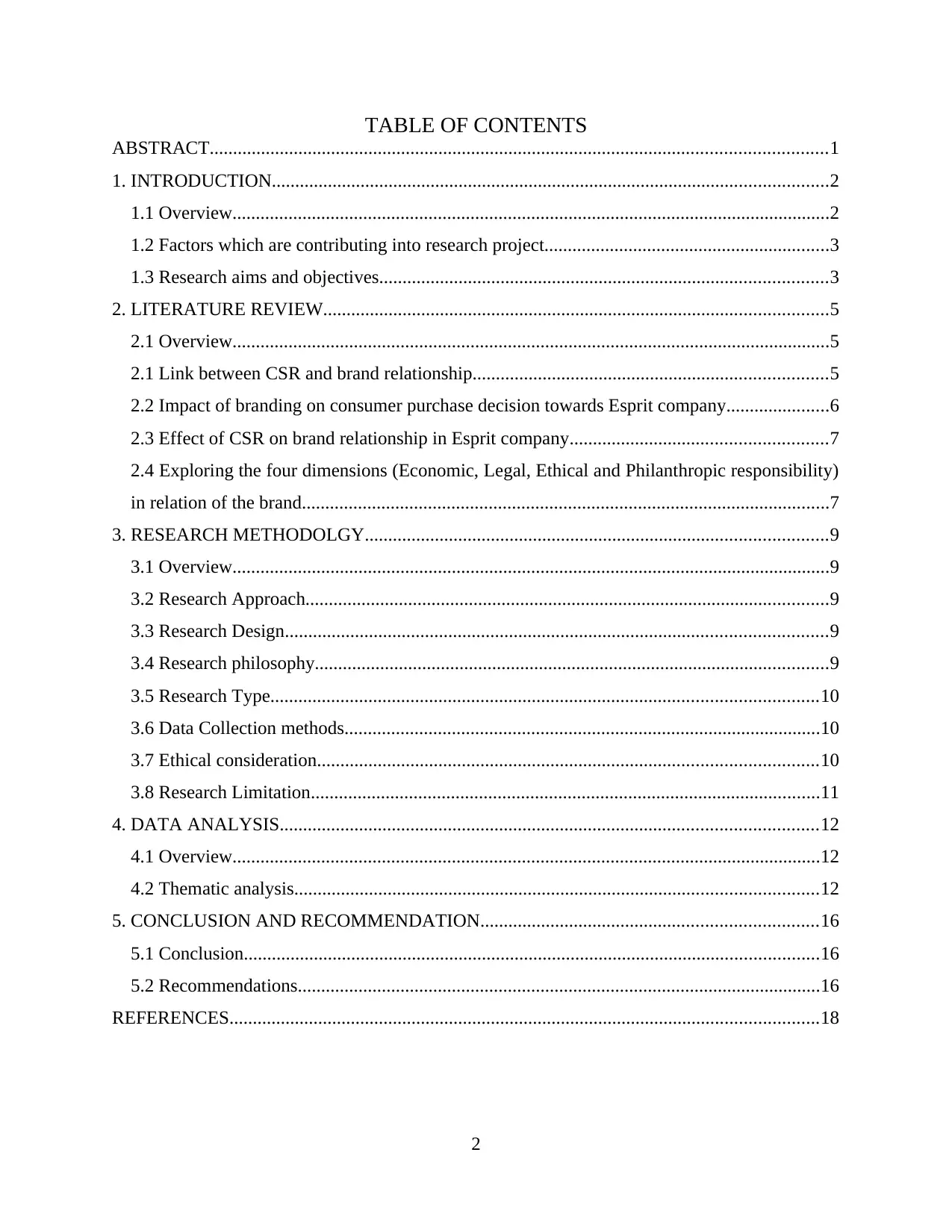
TABLE OF CONTENTS
ABSTRACT....................................................................................................................................1
1. INTRODUCTION.......................................................................................................................2
1.1 Overview................................................................................................................................2
1.2 Factors which are contributing into research project.............................................................3
1.3 Research aims and objectives................................................................................................3
2. LITERATURE REVIEW............................................................................................................5
2.1 Overview................................................................................................................................5
2.1 Link between CSR and brand relationship............................................................................5
2.2 Impact of branding on consumer purchase decision towards Esprit company......................6
2.3 Effect of CSR on brand relationship in Esprit company.......................................................7
2.4 Exploring the four dimensions (Economic, Legal, Ethical and Philanthropic responsibility)
in relation of the brand.................................................................................................................7
3. RESEARCH METHODOLGY...................................................................................................9
3.1 Overview................................................................................................................................9
3.2 Research Approach................................................................................................................9
3.3 Research Design....................................................................................................................9
3.4 Research philosophy..............................................................................................................9
3.5 Research Type.....................................................................................................................10
3.6 Data Collection methods......................................................................................................10
3.7 Ethical consideration...........................................................................................................10
3.8 Research Limitation.............................................................................................................11
4. DATA ANALYSIS...................................................................................................................12
4.1 Overview..............................................................................................................................12
4.2 Thematic analysis................................................................................................................12
5. CONCLUSION AND RECOMMENDATION........................................................................16
5.1 Conclusion...........................................................................................................................16
5.2 Recommendations................................................................................................................16
REFERENCES..............................................................................................................................18
2
ABSTRACT....................................................................................................................................1
1. INTRODUCTION.......................................................................................................................2
1.1 Overview................................................................................................................................2
1.2 Factors which are contributing into research project.............................................................3
1.3 Research aims and objectives................................................................................................3
2. LITERATURE REVIEW............................................................................................................5
2.1 Overview................................................................................................................................5
2.1 Link between CSR and brand relationship............................................................................5
2.2 Impact of branding on consumer purchase decision towards Esprit company......................6
2.3 Effect of CSR on brand relationship in Esprit company.......................................................7
2.4 Exploring the four dimensions (Economic, Legal, Ethical and Philanthropic responsibility)
in relation of the brand.................................................................................................................7
3. RESEARCH METHODOLGY...................................................................................................9
3.1 Overview................................................................................................................................9
3.2 Research Approach................................................................................................................9
3.3 Research Design....................................................................................................................9
3.4 Research philosophy..............................................................................................................9
3.5 Research Type.....................................................................................................................10
3.6 Data Collection methods......................................................................................................10
3.7 Ethical consideration...........................................................................................................10
3.8 Research Limitation.............................................................................................................11
4. DATA ANALYSIS...................................................................................................................12
4.1 Overview..............................................................................................................................12
4.2 Thematic analysis................................................................................................................12
5. CONCLUSION AND RECOMMENDATION........................................................................16
5.1 Conclusion...........................................................................................................................16
5.2 Recommendations................................................................................................................16
REFERENCES..............................................................................................................................18
2
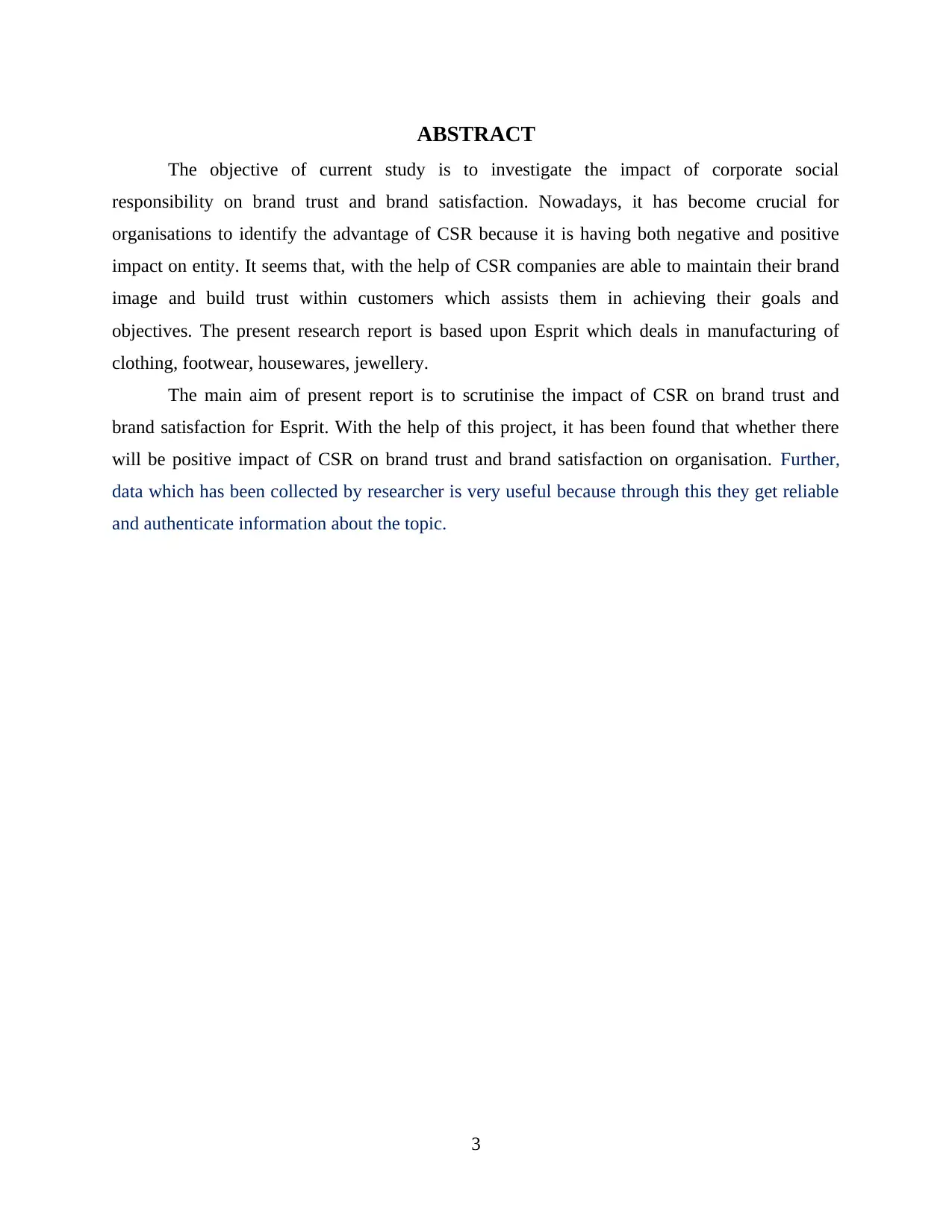
ABSTRACT
The objective of current study is to investigate the impact of corporate social
responsibility on brand trust and brand satisfaction. Nowadays, it has become crucial for
organisations to identify the advantage of CSR because it is having both negative and positive
impact on entity. It seems that, with the help of CSR companies are able to maintain their brand
image and build trust within customers which assists them in achieving their goals and
objectives. The present research report is based upon Esprit which deals in manufacturing of
clothing, footwear, housewares, jewellery.
The main aim of present report is to scrutinise the impact of CSR on brand trust and
brand satisfaction for Esprit. With the help of this project, it has been found that whether there
will be positive impact of CSR on brand trust and brand satisfaction on organisation. Further,
data which has been collected by researcher is very useful because through this they get reliable
and authenticate information about the topic.
3
The objective of current study is to investigate the impact of corporate social
responsibility on brand trust and brand satisfaction. Nowadays, it has become crucial for
organisations to identify the advantage of CSR because it is having both negative and positive
impact on entity. It seems that, with the help of CSR companies are able to maintain their brand
image and build trust within customers which assists them in achieving their goals and
objectives. The present research report is based upon Esprit which deals in manufacturing of
clothing, footwear, housewares, jewellery.
The main aim of present report is to scrutinise the impact of CSR on brand trust and
brand satisfaction for Esprit. With the help of this project, it has been found that whether there
will be positive impact of CSR on brand trust and brand satisfaction on organisation. Further,
data which has been collected by researcher is very useful because through this they get reliable
and authenticate information about the topic.
3
⊘ This is a preview!⊘
Do you want full access?
Subscribe today to unlock all pages.

Trusted by 1+ million students worldwide
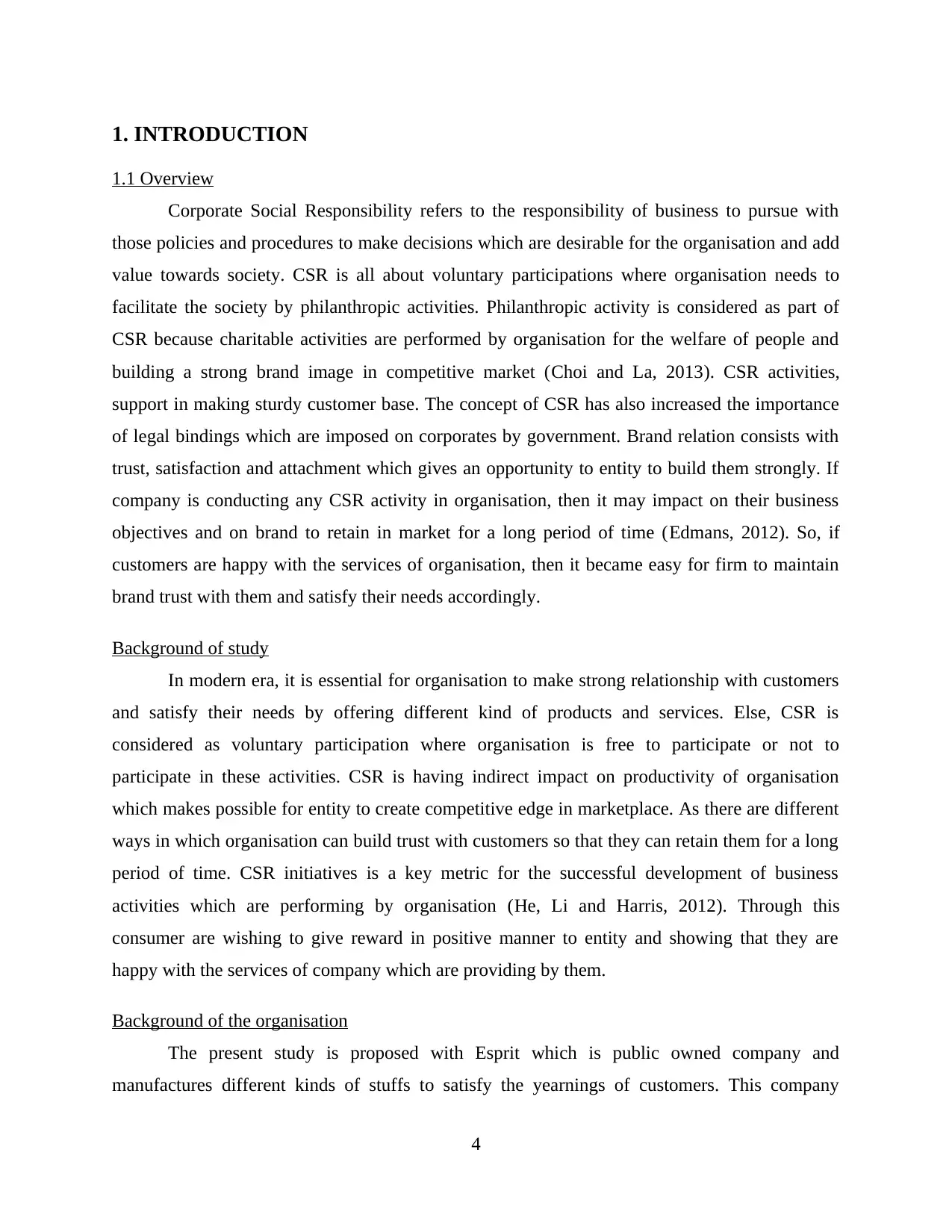
1. INTRODUCTION
1.1 Overview
Corporate Social Responsibility refers to the responsibility of business to pursue with
those policies and procedures to make decisions which are desirable for the organisation and add
value towards society. CSR is all about voluntary participations where organisation needs to
facilitate the society by philanthropic activities. Philanthropic activity is considered as part of
CSR because charitable activities are performed by organisation for the welfare of people and
building a strong brand image in competitive market (Choi and La, 2013). CSR activities,
support in making sturdy customer base. The concept of CSR has also increased the importance
of legal bindings which are imposed on corporates by government. Brand relation consists with
trust, satisfaction and attachment which gives an opportunity to entity to build them strongly. If
company is conducting any CSR activity in organisation, then it may impact on their business
objectives and on brand to retain in market for a long period of time (Edmans, 2012). So, if
customers are happy with the services of organisation, then it became easy for firm to maintain
brand trust with them and satisfy their needs accordingly.
Background of study
In modern era, it is essential for organisation to make strong relationship with customers
and satisfy their needs by offering different kind of products and services. Else, CSR is
considered as voluntary participation where organisation is free to participate or not to
participate in these activities. CSR is having indirect impact on productivity of organisation
which makes possible for entity to create competitive edge in marketplace. As there are different
ways in which organisation can build trust with customers so that they can retain them for a long
period of time. CSR initiatives is a key metric for the successful development of business
activities which are performing by organisation (He, Li and Harris, 2012). Through this
consumer are wishing to give reward in positive manner to entity and showing that they are
happy with the services of company which are providing by them.
Background of the organisation
The present study is proposed with Esprit which is public owned company and
manufactures different kinds of stuffs to satisfy the yearnings of customers. This company
4
1.1 Overview
Corporate Social Responsibility refers to the responsibility of business to pursue with
those policies and procedures to make decisions which are desirable for the organisation and add
value towards society. CSR is all about voluntary participations where organisation needs to
facilitate the society by philanthropic activities. Philanthropic activity is considered as part of
CSR because charitable activities are performed by organisation for the welfare of people and
building a strong brand image in competitive market (Choi and La, 2013). CSR activities,
support in making sturdy customer base. The concept of CSR has also increased the importance
of legal bindings which are imposed on corporates by government. Brand relation consists with
trust, satisfaction and attachment which gives an opportunity to entity to build them strongly. If
company is conducting any CSR activity in organisation, then it may impact on their business
objectives and on brand to retain in market for a long period of time (Edmans, 2012). So, if
customers are happy with the services of organisation, then it became easy for firm to maintain
brand trust with them and satisfy their needs accordingly.
Background of study
In modern era, it is essential for organisation to make strong relationship with customers
and satisfy their needs by offering different kind of products and services. Else, CSR is
considered as voluntary participation where organisation is free to participate or not to
participate in these activities. CSR is having indirect impact on productivity of organisation
which makes possible for entity to create competitive edge in marketplace. As there are different
ways in which organisation can build trust with customers so that they can retain them for a long
period of time. CSR initiatives is a key metric for the successful development of business
activities which are performing by organisation (He, Li and Harris, 2012). Through this
consumer are wishing to give reward in positive manner to entity and showing that they are
happy with the services of company which are providing by them.
Background of the organisation
The present study is proposed with Esprit which is public owned company and
manufactures different kinds of stuffs to satisfy the yearnings of customers. This company
4
Paraphrase This Document
Need a fresh take? Get an instant paraphrase of this document with our AI Paraphraser
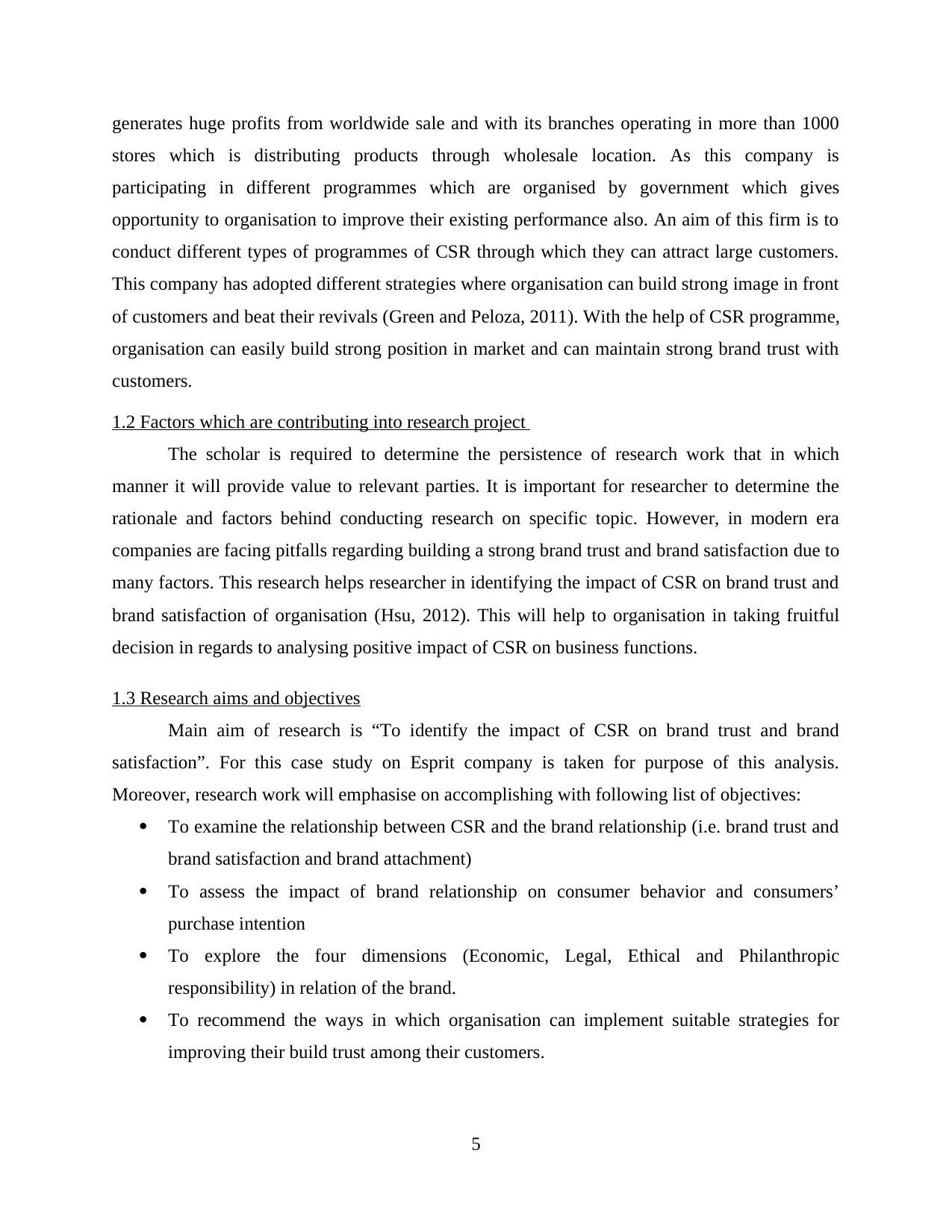
generates huge profits from worldwide sale and with its branches operating in more than 1000
stores which is distributing products through wholesale location. As this company is
participating in different programmes which are organised by government which gives
opportunity to organisation to improve their existing performance also. An aim of this firm is to
conduct different types of programmes of CSR through which they can attract large customers.
This company has adopted different strategies where organisation can build strong image in front
of customers and beat their revivals (Green and Peloza, 2011). With the help of CSR programme,
organisation can easily build strong position in market and can maintain strong brand trust with
customers.
1.2 Factors which are contributing into research project
The scholar is required to determine the persistence of research work that in which
manner it will provide value to relevant parties. It is important for researcher to determine the
rationale and factors behind conducting research on specific topic. However, in modern era
companies are facing pitfalls regarding building a strong brand trust and brand satisfaction due to
many factors. This research helps researcher in identifying the impact of CSR on brand trust and
brand satisfaction of organisation (Hsu, 2012). This will help to organisation in taking fruitful
decision in regards to analysing positive impact of CSR on business functions.
1.3 Research aims and objectives
Main aim of research is “To identify the impact of CSR on brand trust and brand
satisfaction”. For this case study on Esprit company is taken for purpose of this analysis.
Moreover, research work will emphasise on accomplishing with following list of objectives:
To examine the relationship between CSR and the brand relationship (i.e. brand trust and
brand satisfaction and brand attachment)
To assess the impact of brand relationship on consumer behavior and consumers’
purchase intention
To explore the four dimensions (Economic, Legal, Ethical and Philanthropic
responsibility) in relation of the brand.
To recommend the ways in which organisation can implement suitable strategies for
improving their build trust among their customers.
5
stores which is distributing products through wholesale location. As this company is
participating in different programmes which are organised by government which gives
opportunity to organisation to improve their existing performance also. An aim of this firm is to
conduct different types of programmes of CSR through which they can attract large customers.
This company has adopted different strategies where organisation can build strong image in front
of customers and beat their revivals (Green and Peloza, 2011). With the help of CSR programme,
organisation can easily build strong position in market and can maintain strong brand trust with
customers.
1.2 Factors which are contributing into research project
The scholar is required to determine the persistence of research work that in which
manner it will provide value to relevant parties. It is important for researcher to determine the
rationale and factors behind conducting research on specific topic. However, in modern era
companies are facing pitfalls regarding building a strong brand trust and brand satisfaction due to
many factors. This research helps researcher in identifying the impact of CSR on brand trust and
brand satisfaction of organisation (Hsu, 2012). This will help to organisation in taking fruitful
decision in regards to analysing positive impact of CSR on business functions.
1.3 Research aims and objectives
Main aim of research is “To identify the impact of CSR on brand trust and brand
satisfaction”. For this case study on Esprit company is taken for purpose of this analysis.
Moreover, research work will emphasise on accomplishing with following list of objectives:
To examine the relationship between CSR and the brand relationship (i.e. brand trust and
brand satisfaction and brand attachment)
To assess the impact of brand relationship on consumer behavior and consumers’
purchase intention
To explore the four dimensions (Economic, Legal, Ethical and Philanthropic
responsibility) in relation of the brand.
To recommend the ways in which organisation can implement suitable strategies for
improving their build trust among their customers.
5

Research Question
What is the impact of CSR on brand relationship which includes both trust and
satisfaction in Esprit organisation?
6
What is the impact of CSR on brand relationship which includes both trust and
satisfaction in Esprit organisation?
6
⊘ This is a preview!⊘
Do you want full access?
Subscribe today to unlock all pages.

Trusted by 1+ million students worldwide
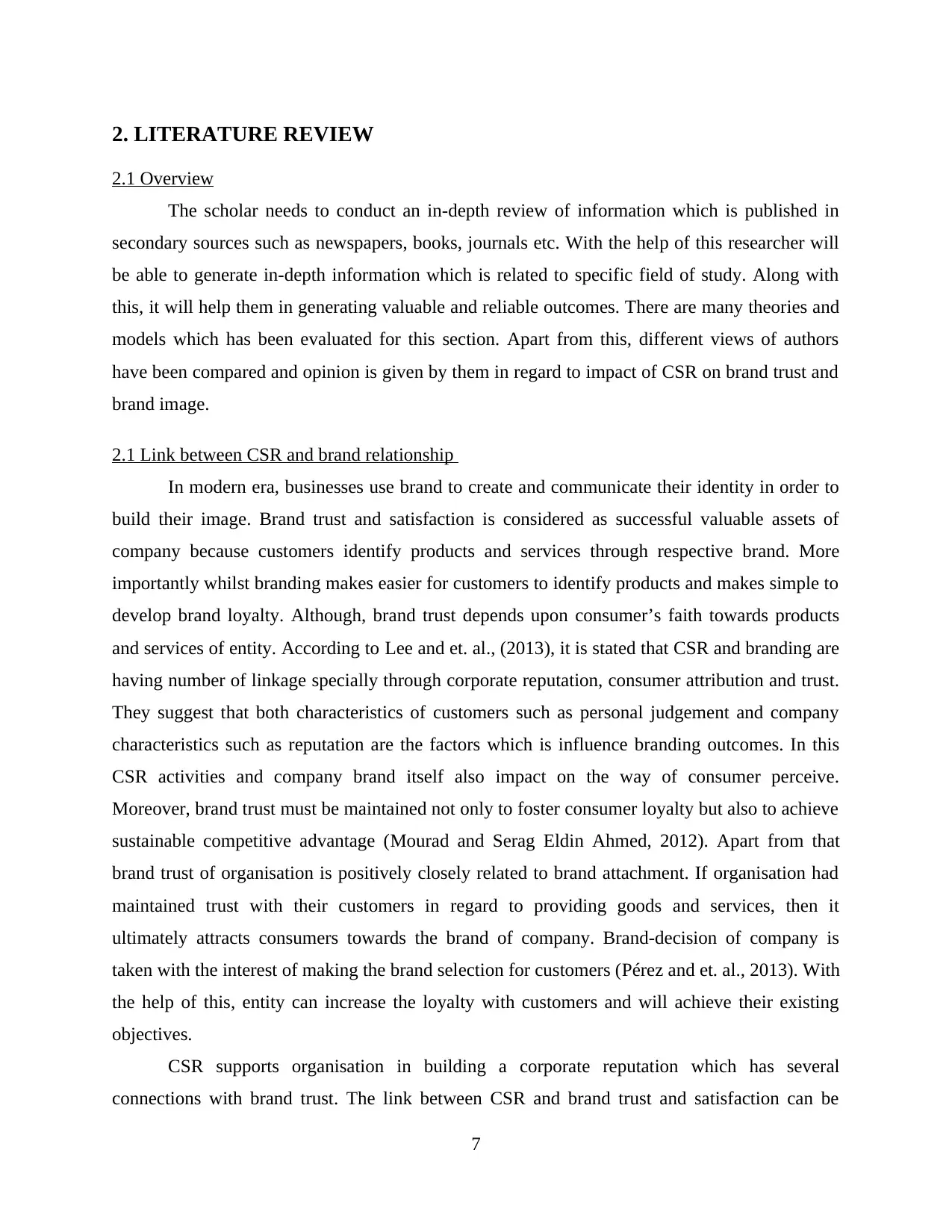
2. LITERATURE REVIEW
2.1 Overview
The scholar needs to conduct an in-depth review of information which is published in
secondary sources such as newspapers, books, journals etc. With the help of this researcher will
be able to generate in-depth information which is related to specific field of study. Along with
this, it will help them in generating valuable and reliable outcomes. There are many theories and
models which has been evaluated for this section. Apart from this, different views of authors
have been compared and opinion is given by them in regard to impact of CSR on brand trust and
brand image.
2.1 Link between CSR and brand relationship
In modern era, businesses use brand to create and communicate their identity in order to
build their image. Brand trust and satisfaction is considered as successful valuable assets of
company because customers identify products and services through respective brand. More
importantly whilst branding makes easier for customers to identify products and makes simple to
develop brand loyalty. Although, brand trust depends upon consumer’s faith towards products
and services of entity. According to Lee and et. al., (2013), it is stated that CSR and branding are
having number of linkage specially through corporate reputation, consumer attribution and trust.
They suggest that both characteristics of customers such as personal judgement and company
characteristics such as reputation are the factors which is influence branding outcomes. In this
CSR activities and company brand itself also impact on the way of consumer perceive.
Moreover, brand trust must be maintained not only to foster consumer loyalty but also to achieve
sustainable competitive advantage (Mourad and Serag Eldin Ahmed, 2012). Apart from that
brand trust of organisation is positively closely related to brand attachment. If organisation had
maintained trust with their customers in regard to providing goods and services, then it
ultimately attracts consumers towards the brand of company. Brand-decision of company is
taken with the interest of making the brand selection for customers (Pérez and et. al., 2013). With
the help of this, entity can increase the loyalty with customers and will achieve their existing
objectives.
CSR supports organisation in building a corporate reputation which has several
connections with brand trust. The link between CSR and brand trust and satisfaction can be
7
2.1 Overview
The scholar needs to conduct an in-depth review of information which is published in
secondary sources such as newspapers, books, journals etc. With the help of this researcher will
be able to generate in-depth information which is related to specific field of study. Along with
this, it will help them in generating valuable and reliable outcomes. There are many theories and
models which has been evaluated for this section. Apart from this, different views of authors
have been compared and opinion is given by them in regard to impact of CSR on brand trust and
brand image.
2.1 Link between CSR and brand relationship
In modern era, businesses use brand to create and communicate their identity in order to
build their image. Brand trust and satisfaction is considered as successful valuable assets of
company because customers identify products and services through respective brand. More
importantly whilst branding makes easier for customers to identify products and makes simple to
develop brand loyalty. Although, brand trust depends upon consumer’s faith towards products
and services of entity. According to Lee and et. al., (2013), it is stated that CSR and branding are
having number of linkage specially through corporate reputation, consumer attribution and trust.
They suggest that both characteristics of customers such as personal judgement and company
characteristics such as reputation are the factors which is influence branding outcomes. In this
CSR activities and company brand itself also impact on the way of consumer perceive.
Moreover, brand trust must be maintained not only to foster consumer loyalty but also to achieve
sustainable competitive advantage (Mourad and Serag Eldin Ahmed, 2012). Apart from that
brand trust of organisation is positively closely related to brand attachment. If organisation had
maintained trust with their customers in regard to providing goods and services, then it
ultimately attracts consumers towards the brand of company. Brand-decision of company is
taken with the interest of making the brand selection for customers (Pérez and et. al., 2013). With
the help of this, entity can increase the loyalty with customers and will achieve their existing
objectives.
CSR supports organisation in building a corporate reputation which has several
connections with brand trust. The link between CSR and brand trust and satisfaction can be
7
Paraphrase This Document
Need a fresh take? Get an instant paraphrase of this document with our AI Paraphraser
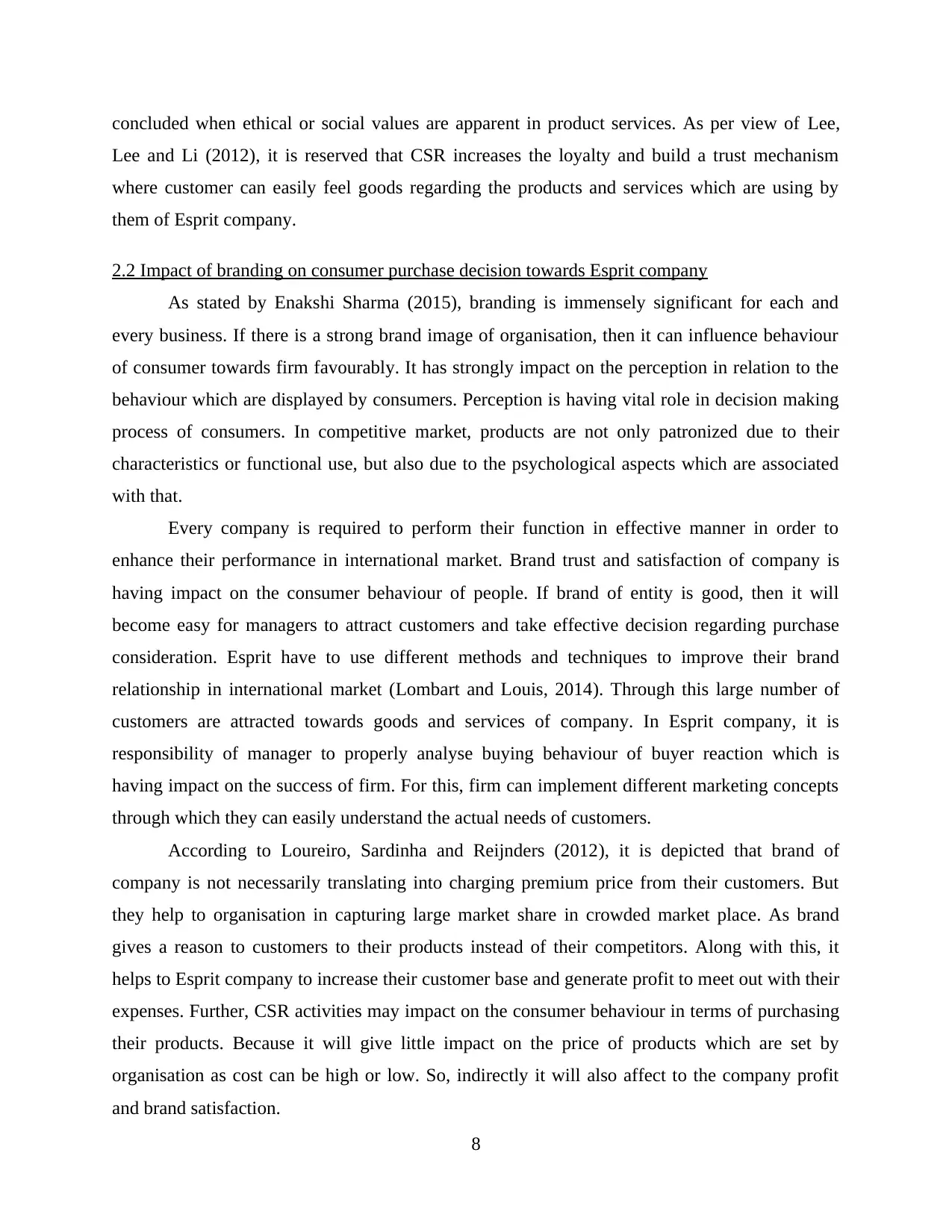
concluded when ethical or social values are apparent in product services. As per view of Lee,
Lee and Li (2012), it is reserved that CSR increases the loyalty and build a trust mechanism
where customer can easily feel goods regarding the products and services which are using by
them of Esprit company.
2.2 Impact of branding on consumer purchase decision towards Esprit company
As stated by Enakshi Sharma (2015), branding is immensely significant for each and
every business. If there is a strong brand image of organisation, then it can influence behaviour
of consumer towards firm favourably. It has strongly impact on the perception in relation to the
behaviour which are displayed by consumers. Perception is having vital role in decision making
process of consumers. In competitive market, products are not only patronized due to their
characteristics or functional use, but also due to the psychological aspects which are associated
with that.
Every company is required to perform their function in effective manner in order to
enhance their performance in international market. Brand trust and satisfaction of company is
having impact on the consumer behaviour of people. If brand of entity is good, then it will
become easy for managers to attract customers and take effective decision regarding purchase
consideration. Esprit have to use different methods and techniques to improve their brand
relationship in international market (Lombart and Louis, 2014). Through this large number of
customers are attracted towards goods and services of company. In Esprit company, it is
responsibility of manager to properly analyse buying behaviour of buyer reaction which is
having impact on the success of firm. For this, firm can implement different marketing concepts
through which they can easily understand the actual needs of customers.
According to Loureiro, Sardinha and Reijnders (2012), it is depicted that brand of
company is not necessarily translating into charging premium price from their customers. But
they help to organisation in capturing large market share in crowded market place. As brand
gives a reason to customers to their products instead of their competitors. Along with this, it
helps to Esprit company to increase their customer base and generate profit to meet out with their
expenses. Further, CSR activities may impact on the consumer behaviour in terms of purchasing
their products. Because it will give little impact on the price of products which are set by
organisation as cost can be high or low. So, indirectly it will also affect to the company profit
and brand satisfaction.
8
Lee and Li (2012), it is reserved that CSR increases the loyalty and build a trust mechanism
where customer can easily feel goods regarding the products and services which are using by
them of Esprit company.
2.2 Impact of branding on consumer purchase decision towards Esprit company
As stated by Enakshi Sharma (2015), branding is immensely significant for each and
every business. If there is a strong brand image of organisation, then it can influence behaviour
of consumer towards firm favourably. It has strongly impact on the perception in relation to the
behaviour which are displayed by consumers. Perception is having vital role in decision making
process of consumers. In competitive market, products are not only patronized due to their
characteristics or functional use, but also due to the psychological aspects which are associated
with that.
Every company is required to perform their function in effective manner in order to
enhance their performance in international market. Brand trust and satisfaction of company is
having impact on the consumer behaviour of people. If brand of entity is good, then it will
become easy for managers to attract customers and take effective decision regarding purchase
consideration. Esprit have to use different methods and techniques to improve their brand
relationship in international market (Lombart and Louis, 2014). Through this large number of
customers are attracted towards goods and services of company. In Esprit company, it is
responsibility of manager to properly analyse buying behaviour of buyer reaction which is
having impact on the success of firm. For this, firm can implement different marketing concepts
through which they can easily understand the actual needs of customers.
According to Loureiro, Sardinha and Reijnders (2012), it is depicted that brand of
company is not necessarily translating into charging premium price from their customers. But
they help to organisation in capturing large market share in crowded market place. As brand
gives a reason to customers to their products instead of their competitors. Along with this, it
helps to Esprit company to increase their customer base and generate profit to meet out with their
expenses. Further, CSR activities may impact on the consumer behaviour in terms of purchasing
their products. Because it will give little impact on the price of products which are set by
organisation as cost can be high or low. So, indirectly it will also affect to the company profit
and brand satisfaction.
8
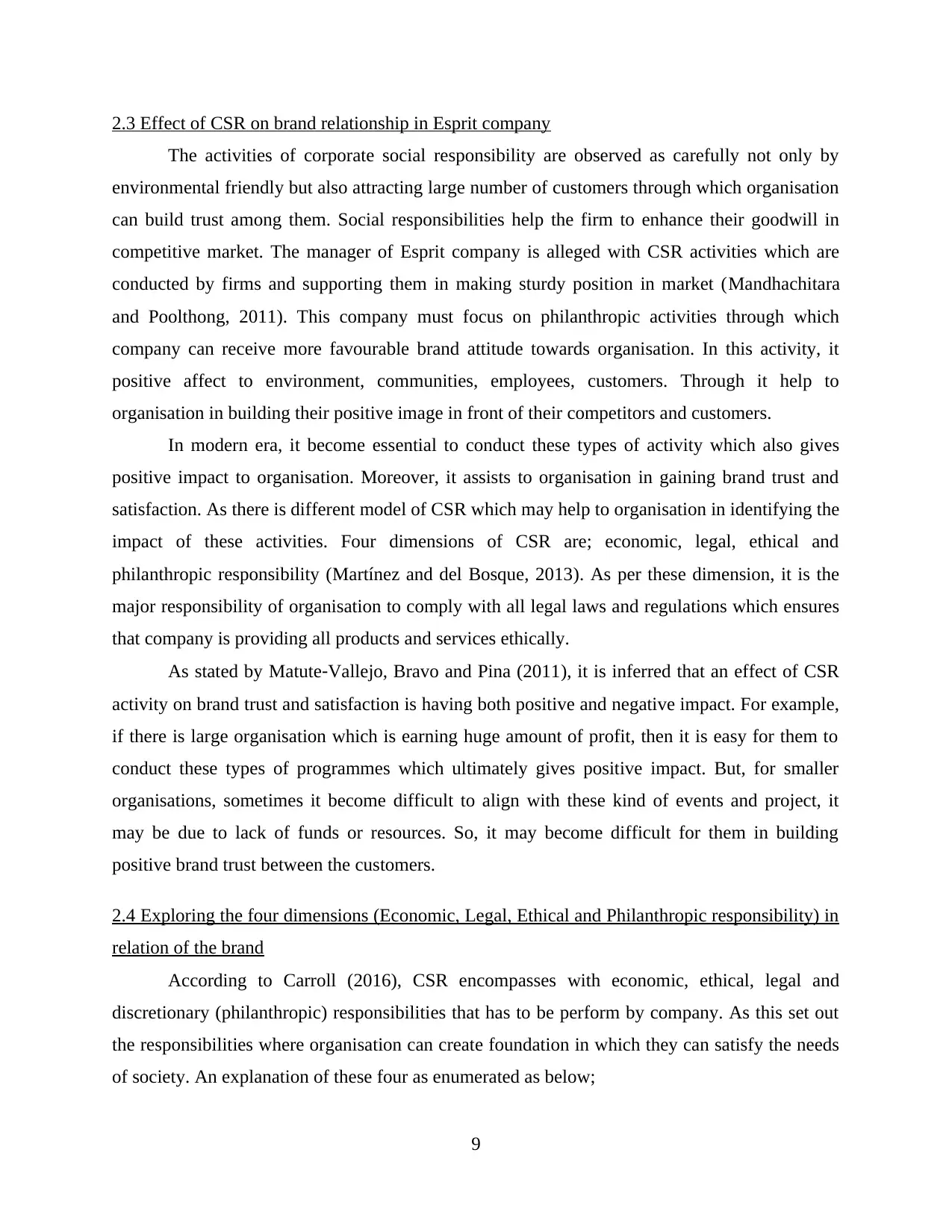
2.3 Effect of CSR on brand relationship in Esprit company
The activities of corporate social responsibility are observed as carefully not only by
environmental friendly but also attracting large number of customers through which organisation
can build trust among them. Social responsibilities help the firm to enhance their goodwill in
competitive market. The manager of Esprit company is alleged with CSR activities which are
conducted by firms and supporting them in making sturdy position in market (Mandhachitara
and Poolthong, 2011). This company must focus on philanthropic activities through which
company can receive more favourable brand attitude towards organisation. In this activity, it
positive affect to environment, communities, employees, customers. Through it help to
organisation in building their positive image in front of their competitors and customers.
In modern era, it become essential to conduct these types of activity which also gives
positive impact to organisation. Moreover, it assists to organisation in gaining brand trust and
satisfaction. As there is different model of CSR which may help to organisation in identifying the
impact of these activities. Four dimensions of CSR are; economic, legal, ethical and
philanthropic responsibility (Martínez and del Bosque, 2013). As per these dimension, it is the
major responsibility of organisation to comply with all legal laws and regulations which ensures
that company is providing all products and services ethically.
As stated by Matute‐Vallejo, Bravo and Pina (2011), it is inferred that an effect of CSR
activity on brand trust and satisfaction is having both positive and negative impact. For example,
if there is large organisation which is earning huge amount of profit, then it is easy for them to
conduct these types of programmes which ultimately gives positive impact. But, for smaller
organisations, sometimes it become difficult to align with these kind of events and project, it
may be due to lack of funds or resources. So, it may become difficult for them in building
positive brand trust between the customers.
2.4 Exploring the four dimensions (Economic, Legal, Ethical and Philanthropic responsibility) in
relation of the brand
According to Carroll (2016), CSR encompasses with economic, ethical, legal and
discretionary (philanthropic) responsibilities that has to be perform by company. As this set out
the responsibilities where organisation can create foundation in which they can satisfy the needs
of society. An explanation of these four as enumerated as below;
9
The activities of corporate social responsibility are observed as carefully not only by
environmental friendly but also attracting large number of customers through which organisation
can build trust among them. Social responsibilities help the firm to enhance their goodwill in
competitive market. The manager of Esprit company is alleged with CSR activities which are
conducted by firms and supporting them in making sturdy position in market (Mandhachitara
and Poolthong, 2011). This company must focus on philanthropic activities through which
company can receive more favourable brand attitude towards organisation. In this activity, it
positive affect to environment, communities, employees, customers. Through it help to
organisation in building their positive image in front of their competitors and customers.
In modern era, it become essential to conduct these types of activity which also gives
positive impact to organisation. Moreover, it assists to organisation in gaining brand trust and
satisfaction. As there is different model of CSR which may help to organisation in identifying the
impact of these activities. Four dimensions of CSR are; economic, legal, ethical and
philanthropic responsibility (Martínez and del Bosque, 2013). As per these dimension, it is the
major responsibility of organisation to comply with all legal laws and regulations which ensures
that company is providing all products and services ethically.
As stated by Matute‐Vallejo, Bravo and Pina (2011), it is inferred that an effect of CSR
activity on brand trust and satisfaction is having both positive and negative impact. For example,
if there is large organisation which is earning huge amount of profit, then it is easy for them to
conduct these types of programmes which ultimately gives positive impact. But, for smaller
organisations, sometimes it become difficult to align with these kind of events and project, it
may be due to lack of funds or resources. So, it may become difficult for them in building
positive brand trust between the customers.
2.4 Exploring the four dimensions (Economic, Legal, Ethical and Philanthropic responsibility) in
relation of the brand
According to Carroll (2016), CSR encompasses with economic, ethical, legal and
discretionary (philanthropic) responsibilities that has to be perform by company. As this set out
the responsibilities where organisation can create foundation in which they can satisfy the needs
of society. An explanation of these four as enumerated as below;
9
⊘ This is a preview!⊘
Do you want full access?
Subscribe today to unlock all pages.

Trusted by 1+ million students worldwide
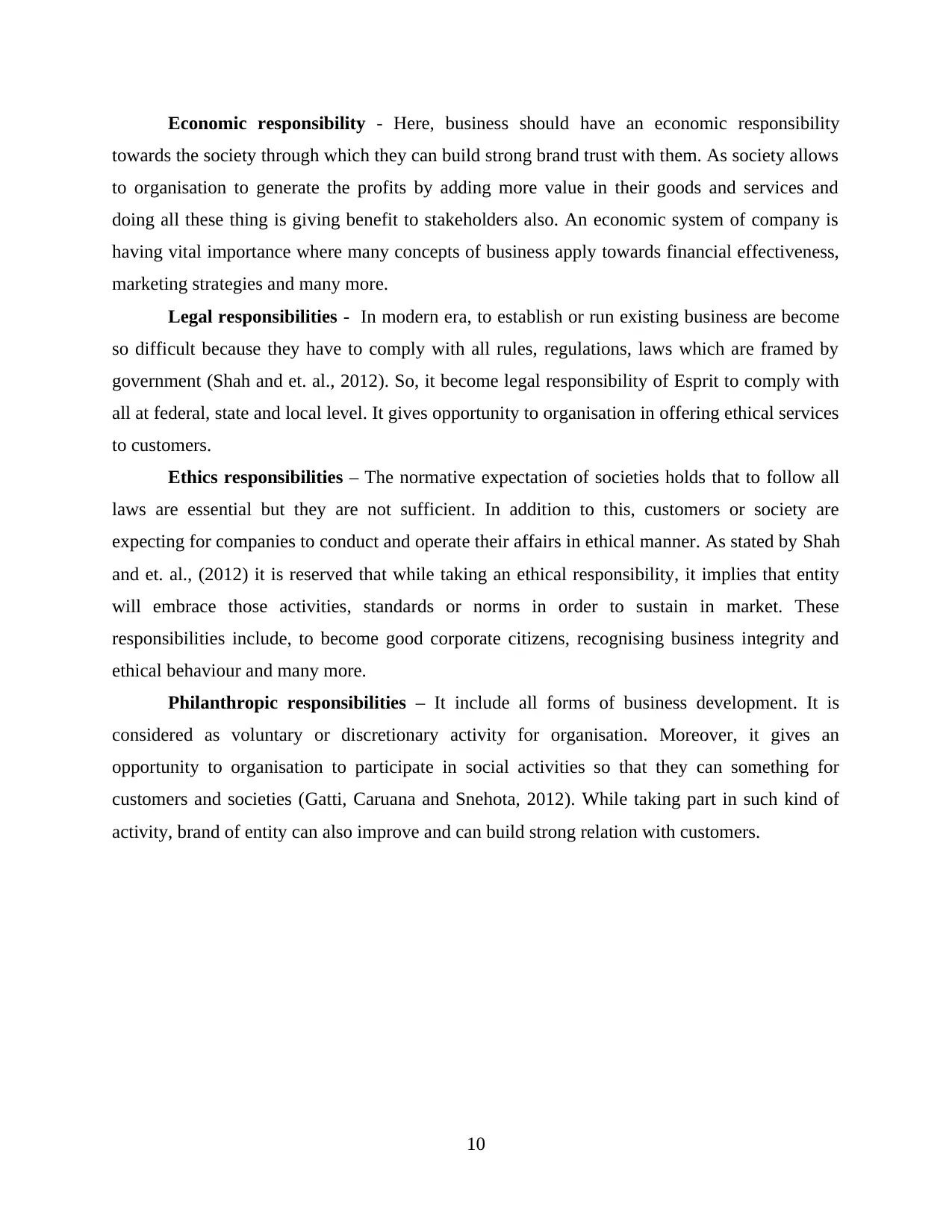
Economic responsibility - Here, business should have an economic responsibility
towards the society through which they can build strong brand trust with them. As society allows
to organisation to generate the profits by adding more value in their goods and services and
doing all these thing is giving benefit to stakeholders also. An economic system of company is
having vital importance where many concepts of business apply towards financial effectiveness,
marketing strategies and many more.
Legal responsibilities - In modern era, to establish or run existing business are become
so difficult because they have to comply with all rules, regulations, laws which are framed by
government (Shah and et. al., 2012). So, it become legal responsibility of Esprit to comply with
all at federal, state and local level. It gives opportunity to organisation in offering ethical services
to customers.
Ethics responsibilities – The normative expectation of societies holds that to follow all
laws are essential but they are not sufficient. In addition to this, customers or society are
expecting for companies to conduct and operate their affairs in ethical manner. As stated by Shah
and et. al., (2012) it is reserved that while taking an ethical responsibility, it implies that entity
will embrace those activities, standards or norms in order to sustain in market. These
responsibilities include, to become good corporate citizens, recognising business integrity and
ethical behaviour and many more.
Philanthropic responsibilities – It include all forms of business development. It is
considered as voluntary or discretionary activity for organisation. Moreover, it gives an
opportunity to organisation to participate in social activities so that they can something for
customers and societies (Gatti, Caruana and Snehota, 2012). While taking part in such kind of
activity, brand of entity can also improve and can build strong relation with customers.
10
towards the society through which they can build strong brand trust with them. As society allows
to organisation to generate the profits by adding more value in their goods and services and
doing all these thing is giving benefit to stakeholders also. An economic system of company is
having vital importance where many concepts of business apply towards financial effectiveness,
marketing strategies and many more.
Legal responsibilities - In modern era, to establish or run existing business are become
so difficult because they have to comply with all rules, regulations, laws which are framed by
government (Shah and et. al., 2012). So, it become legal responsibility of Esprit to comply with
all at federal, state and local level. It gives opportunity to organisation in offering ethical services
to customers.
Ethics responsibilities – The normative expectation of societies holds that to follow all
laws are essential but they are not sufficient. In addition to this, customers or society are
expecting for companies to conduct and operate their affairs in ethical manner. As stated by Shah
and et. al., (2012) it is reserved that while taking an ethical responsibility, it implies that entity
will embrace those activities, standards or norms in order to sustain in market. These
responsibilities include, to become good corporate citizens, recognising business integrity and
ethical behaviour and many more.
Philanthropic responsibilities – It include all forms of business development. It is
considered as voluntary or discretionary activity for organisation. Moreover, it gives an
opportunity to organisation to participate in social activities so that they can something for
customers and societies (Gatti, Caruana and Snehota, 2012). While taking part in such kind of
activity, brand of entity can also improve and can build strong relation with customers.
10
Paraphrase This Document
Need a fresh take? Get an instant paraphrase of this document with our AI Paraphraser
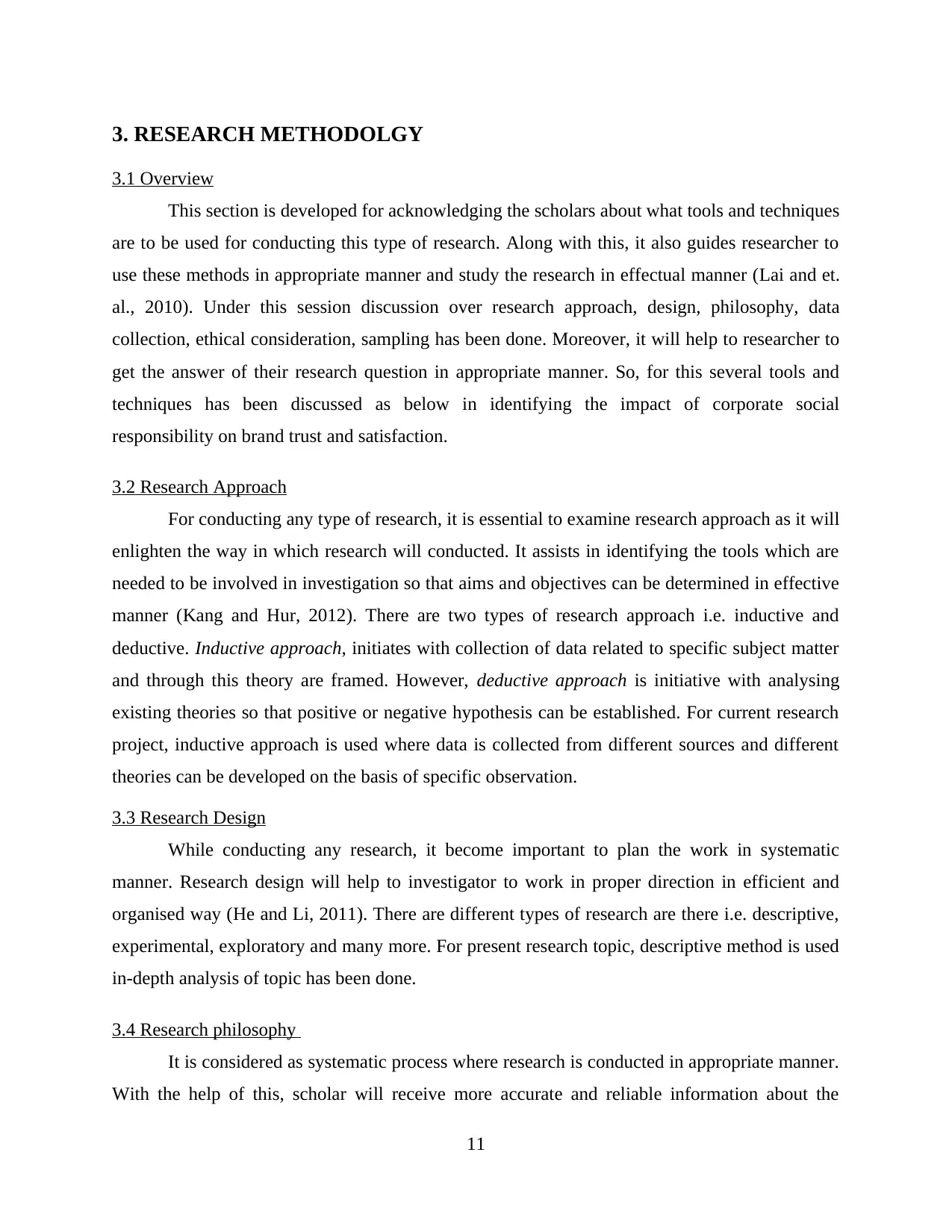
3. RESEARCH METHODOLGY
3.1 Overview
This section is developed for acknowledging the scholars about what tools and techniques
are to be used for conducting this type of research. Along with this, it also guides researcher to
use these methods in appropriate manner and study the research in effectual manner (Lai and et.
al., 2010). Under this session discussion over research approach, design, philosophy, data
collection, ethical consideration, sampling has been done. Moreover, it will help to researcher to
get the answer of their research question in appropriate manner. So, for this several tools and
techniques has been discussed as below in identifying the impact of corporate social
responsibility on brand trust and satisfaction.
3.2 Research Approach
For conducting any type of research, it is essential to examine research approach as it will
enlighten the way in which research will conducted. It assists in identifying the tools which are
needed to be involved in investigation so that aims and objectives can be determined in effective
manner (Kang and Hur, 2012). There are two types of research approach i.e. inductive and
deductive. Inductive approach, initiates with collection of data related to specific subject matter
and through this theory are framed. However, deductive approach is initiative with analysing
existing theories so that positive or negative hypothesis can be established. For current research
project, inductive approach is used where data is collected from different sources and different
theories can be developed on the basis of specific observation.
3.3 Research Design
While conducting any research, it become important to plan the work in systematic
manner. Research design will help to investigator to work in proper direction in efficient and
organised way (He and Li, 2011). There are different types of research are there i.e. descriptive,
experimental, exploratory and many more. For present research topic, descriptive method is used
in-depth analysis of topic has been done.
3.4 Research philosophy
It is considered as systematic process where research is conducted in appropriate manner.
With the help of this, scholar will receive more accurate and reliable information about the
11
3.1 Overview
This section is developed for acknowledging the scholars about what tools and techniques
are to be used for conducting this type of research. Along with this, it also guides researcher to
use these methods in appropriate manner and study the research in effectual manner (Lai and et.
al., 2010). Under this session discussion over research approach, design, philosophy, data
collection, ethical consideration, sampling has been done. Moreover, it will help to researcher to
get the answer of their research question in appropriate manner. So, for this several tools and
techniques has been discussed as below in identifying the impact of corporate social
responsibility on brand trust and satisfaction.
3.2 Research Approach
For conducting any type of research, it is essential to examine research approach as it will
enlighten the way in which research will conducted. It assists in identifying the tools which are
needed to be involved in investigation so that aims and objectives can be determined in effective
manner (Kang and Hur, 2012). There are two types of research approach i.e. inductive and
deductive. Inductive approach, initiates with collection of data related to specific subject matter
and through this theory are framed. However, deductive approach is initiative with analysing
existing theories so that positive or negative hypothesis can be established. For current research
project, inductive approach is used where data is collected from different sources and different
theories can be developed on the basis of specific observation.
3.3 Research Design
While conducting any research, it become important to plan the work in systematic
manner. Research design will help to investigator to work in proper direction in efficient and
organised way (He and Li, 2011). There are different types of research are there i.e. descriptive,
experimental, exploratory and many more. For present research topic, descriptive method is used
in-depth analysis of topic has been done.
3.4 Research philosophy
It is considered as systematic process where research is conducted in appropriate manner.
With the help of this, scholar will receive more accurate and reliable information about the
11
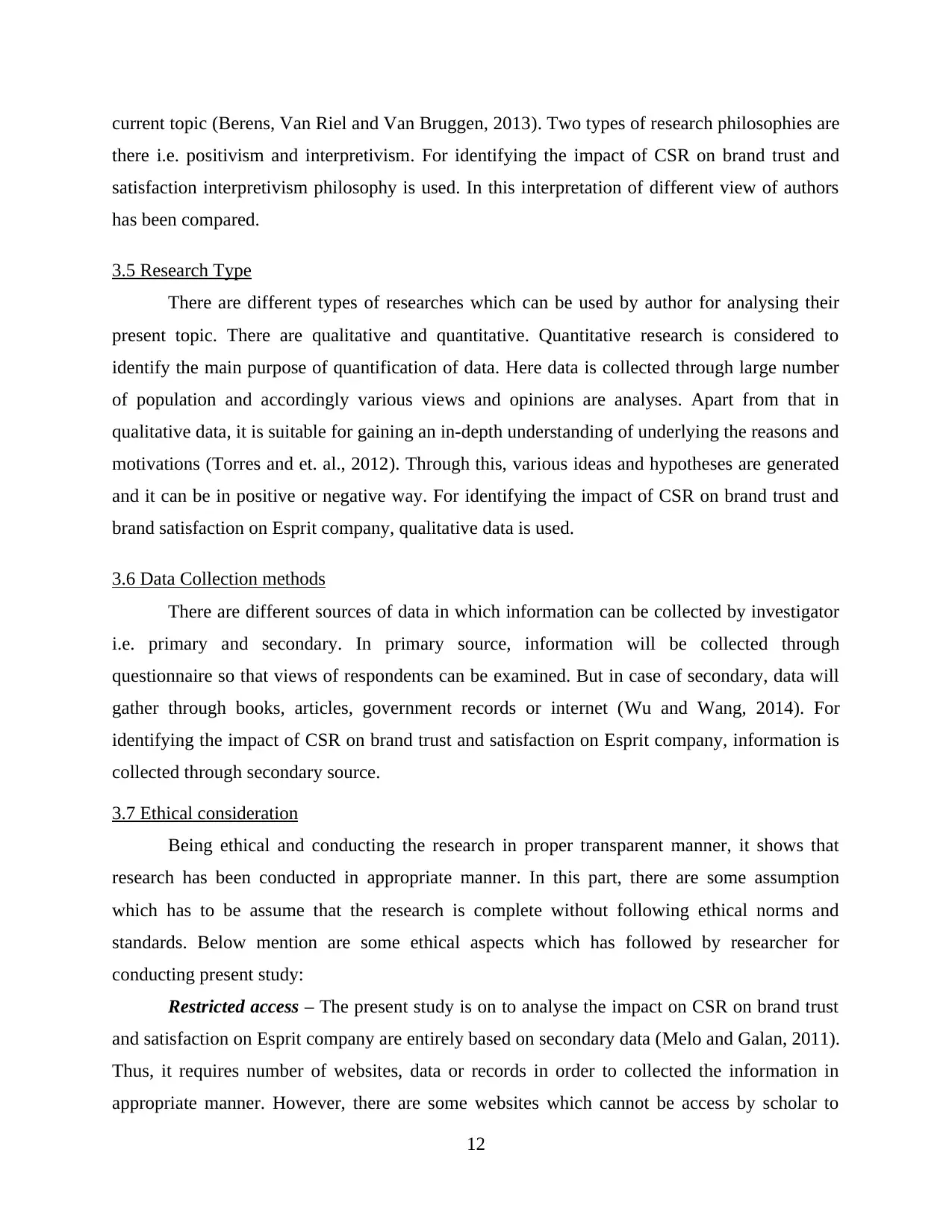
current topic (Berens, Van Riel and Van Bruggen, 2013). Two types of research philosophies are
there i.e. positivism and interpretivism. For identifying the impact of CSR on brand trust and
satisfaction interpretivism philosophy is used. In this interpretation of different view of authors
has been compared.
3.5 Research Type
There are different types of researches which can be used by author for analysing their
present topic. There are qualitative and quantitative. Quantitative research is considered to
identify the main purpose of quantification of data. Here data is collected through large number
of population and accordingly various views and opinions are analyses. Apart from that in
qualitative data, it is suitable for gaining an in-depth understanding of underlying the reasons and
motivations (Torres and et. al., 2012). Through this, various ideas and hypotheses are generated
and it can be in positive or negative way. For identifying the impact of CSR on brand trust and
brand satisfaction on Esprit company, qualitative data is used.
3.6 Data Collection methods
There are different sources of data in which information can be collected by investigator
i.e. primary and secondary. In primary source, information will be collected through
questionnaire so that views of respondents can be examined. But in case of secondary, data will
gather through books, articles, government records or internet (Wu and Wang, 2014). For
identifying the impact of CSR on brand trust and satisfaction on Esprit company, information is
collected through secondary source.
3.7 Ethical consideration
Being ethical and conducting the research in proper transparent manner, it shows that
research has been conducted in appropriate manner. In this part, there are some assumption
which has to be assume that the research is complete without following ethical norms and
standards. Below mention are some ethical aspects which has followed by researcher for
conducting present study:
Restricted access – The present study is on to analyse the impact on CSR on brand trust
and satisfaction on Esprit company are entirely based on secondary data (Melo and Galan, 2011).
Thus, it requires number of websites, data or records in order to collected the information in
appropriate manner. However, there are some websites which cannot be access by scholar to
12
there i.e. positivism and interpretivism. For identifying the impact of CSR on brand trust and
satisfaction interpretivism philosophy is used. In this interpretation of different view of authors
has been compared.
3.5 Research Type
There are different types of researches which can be used by author for analysing their
present topic. There are qualitative and quantitative. Quantitative research is considered to
identify the main purpose of quantification of data. Here data is collected through large number
of population and accordingly various views and opinions are analyses. Apart from that in
qualitative data, it is suitable for gaining an in-depth understanding of underlying the reasons and
motivations (Torres and et. al., 2012). Through this, various ideas and hypotheses are generated
and it can be in positive or negative way. For identifying the impact of CSR on brand trust and
brand satisfaction on Esprit company, qualitative data is used.
3.6 Data Collection methods
There are different sources of data in which information can be collected by investigator
i.e. primary and secondary. In primary source, information will be collected through
questionnaire so that views of respondents can be examined. But in case of secondary, data will
gather through books, articles, government records or internet (Wu and Wang, 2014). For
identifying the impact of CSR on brand trust and satisfaction on Esprit company, information is
collected through secondary source.
3.7 Ethical consideration
Being ethical and conducting the research in proper transparent manner, it shows that
research has been conducted in appropriate manner. In this part, there are some assumption
which has to be assume that the research is complete without following ethical norms and
standards. Below mention are some ethical aspects which has followed by researcher for
conducting present study:
Restricted access – The present study is on to analyse the impact on CSR on brand trust
and satisfaction on Esprit company are entirely based on secondary data (Melo and Galan, 2011).
Thus, it requires number of websites, data or records in order to collected the information in
appropriate manner. However, there are some websites which cannot be access by scholar to
12
⊘ This is a preview!⊘
Do you want full access?
Subscribe today to unlock all pages.

Trusted by 1+ million students worldwide
1 out of 24
Related Documents
Your All-in-One AI-Powered Toolkit for Academic Success.
+13062052269
info@desklib.com
Available 24*7 on WhatsApp / Email
![[object Object]](/_next/static/media/star-bottom.7253800d.svg)
Unlock your academic potential
Copyright © 2020–2026 A2Z Services. All Rights Reserved. Developed and managed by ZUCOL.





